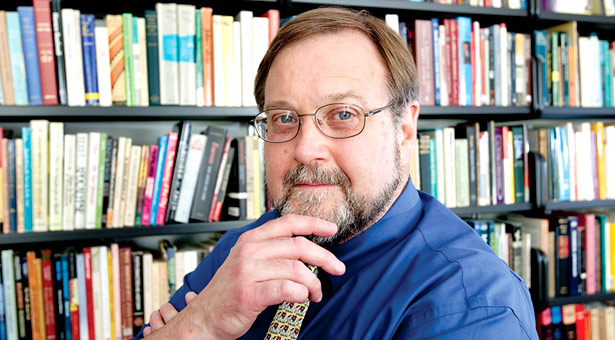The Bible & Theology Toward Christian Maturity
Theologian Rick Steele Goes Behind Bars
Ambassadors in Chains
By Kathy Henning (kathy@spu.edu) | Photo by Mike Siegel

Rick Steele hopes that reading the writings of imprisoned Christians will get his students to think about what they’d do “if preserving their beliefs came at a cost.”
What was Seattle Pacific University’s Rick Steele doing in prison — make that two prisons — earlier this year? Steele, professor of moral and historical theology and the associate dean of Seattle Pacific Seminary, says he was teaching — and learning.
For eight weeks in April and July, in two Washington state prisons, Steele taught a course on literature written by Christians imprisoned for their faith.
Steele’s interest in the subject goes back 30 years. After “a career-defining experience with a parishioner who had been arrested on a narcotics charge,” Steele began to immerse himself in prison literature. A few years ago, he wondered whether his research could be turned into a book. A publisher friend showed interest, “so I started poking along.”
The book, whose working title is Ambassadors in Chains (a reference to Ephesians 6:20), asks, “How do Christians incarcerated for their convictions manage to hold on to those convictions in the face of the dangers, privations, and humiliations of prison life? How do they continue bearing witness to those convictions in spite of the state’s effort to silence them or force them to recant?” When completed, the book will span nearly 16 centuries and nine writers.
So why was Steele teaching behind bars? “I offered the course in order to test my hunch that, given their distinctive angle of vision, the participants would see things in Christian prison literature that I might miss,” he explains.
The courses focused primarily on the literature of two very different “ambassadors in chains”: — Vibia Perpetua, a second-century Roman Catholic noblewoman from North Africa; and American Baptist preacher and civil rights activist Martin Luther King Jr.
To protect the identity of his students, in the manuscript Steele assigns each of them the name of a saint with whom they had something in common.
“Dymphna,” named after the patron saint of therapists because she wanted to help people change, told Steele, “If I had read these texts before I was locked up, I wouldn’t have gotten it. I would have felt troubled and guilty, but that’s about all. Now I’ve learned that I can’t sit still again. I have to do something.”
A former textile worker named for the Apostle Paul, a tentmaker, said, “It’s been a humbling experience for me to be told where to eat, when to eat, what to wear. I have way more empathy for what Perpetua and King went through than I would have before.”
“Urban,” who hopes to become a drug and alcohol counselor after his release, was named after St. Urban of Langres, the patron saint of vintners and alcoholics. (Legend has it, Steele explains, that while hiding from persecution in a vineyard, St. Urban converted all the vinedressers to the faith.)
Reflecting on King’s letter, Urban said, “The part of the letter that I could relate to was at the end, where he says, ‘What else can one do when he is alone in a narrow jail cell other than write long letters, think long thoughts and pray long prayers?’ That spoke to me!”
So far, Steele has completed the introduction to Ambassadors in Chains and the chapters on Perpetua; King; Maximus the Confessor, a seventh-century Eastern Orthodox monastic theologian from Constantinople; and Thomas More, the 16th-century Roman Catholic jurist from England. Next up are chapters on Dietrich Bonhoeffer and Anicius Boethius. “Then I’ll just kind of traipse along until I’m either retired or dead,” he says. “I work best at my own pace.”
In the meantime, he is teaching an Autumn Quarter undergraduate class at SPU on prison literature that includes a 20-hour “solitary confinement” at Camp Casey on Whidbey Island. The class is sure to bring rich new insights for Ambassadors in Chains.
